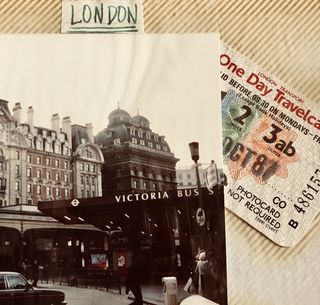Laughter
Reflecting on Your Life Decisions With Kindness and Laughter
The power of seeing life's pathways as an education and not a mistake.
Posted July 19, 2018

Summer vacations and travel can sometimes provide time to reflect on the arc of our adult life. These reflections can be a negative or a positive experience.
My Thirty Year Train Journey
In the autumn of 1987, I was a young Mexican-American university student with long hair and a new suitcase riding a train through the lush English countryside. I felt grateful and content, with a sense of being an intrepid explorer. At that time, I had never traveled outside of the USA, and was on my way to Lancaster University for my “junior year abroad.” Everything felt new and I was in awe of my great fortune.

Fast forward 30+ years to yesterday, when I found myself on a train from Brighton to Guildford, as part of a holiday in England to visit friends I’d made at university in 1987. My hair is more grey now, and my rolling suitcase well traveled, but I still feel grateful and content (and not just because the havoc of a British train system had subsided). However, I didn’t feel like an intrepid explorer anymore. In fact, the train ride felt familiar. “How much has changed in the past 30 years for myself and the world?” I reflected.
In times like this, when the past and the present collide, it is easy to consider the “mistakes” or “missteps” of my past. I considered how I had navigated relationships, raised my children (nearly all grown now), and my unconventional career trajectory. I also considered how much more time I had before wifi, internet, cell phones, or the expectation of near constant communication through these media (distanced only by time zones) existed. As the countryside rolled past, I felt at once 20 and 50 years old. I began to think of the mistakes that I had made between those ages...or were they? Veering towards self-judgement, a simple truth rang forth as the train came to stop at a remote town’s flower decorated platform:
There are benefits to stopping periodically and reflecting honestly on our life journey, but if we don’t do it with kindness and compassion, it can be staggering and even debilitating.
Kind Ways to Examine and Reflect
Throughout life we make a series of choices that send us on pathways we could never anticipate. Our society has a qualitative assessment of what constitutes “success,” but as I grow older, I feel quite sure that these value systems are really more about perpetuating the status quo than about what is best for our soul’s journey.
When and if you decide to examine and reflect on your life, maybe while you are on holiday or taking a life break of some sort, these guiding principles may help you do so with kindness for yourself:
-
Consider whatever has happened as an education, not a mistake. Research shows there is great power in how we name our experiences. For example, calling a group of questions an “IQ test” versus a “puzzle” can change the performance of white or African American students, even when the questions asked are identical (Brown & Day, 2006). African American students do better when it is called a puzzle (reducing stereotype threat). What we call things matters. If our past choices of degree specialty, relationships, or vocation was an education (not a mistake!), we can more easily be grateful for it, and perhaps even be proud of the resultant “learning” we gained.
 Source: Laura Marques/Unsplash
Source: Laura Marques/Unsplash - Forgive yourself and others for imperfections. There is strong evidence that forgiveness provides a plethora of benefits for the person who forgives including improved health and well-being (Toussaint, Worthington & Williams, 2015). Be willing to let go of judgements and cherish the lessons life provides.
- Laugh at the curious nature of the paths that you’ve walked. In reporting on the health impact of laughter on cardiovascular health, Broadbent and colleagues (2018) write, “Different forms of laughter have been found to improve mood, reduce depression, improve immune function, decrease pain and reduce stress hormone concentration” (p.103). Beneath the tragedy, could there actually be a comedy?
- Decide how to love yourself and others going forward. Many great minds have searched for words to describe love, but I like the idea of love as a profound acceptance of what is. Aron & Aron’s (1996) research suggests that humans have a basic motivation to expand the self and that love fuels that expansion, contributing to stronger self-esteem and well-being.

When you are done reflecting, recognize the beauty of your effort. And consider that maybe Socrates was right, that “the unexamined life is not worth living” and therefore your examination has just made your life more worthwhile.
Note: The idea of something being an education and not a mistake was heard in a talk by Swami Smaranananda, 2017.
References
Aron, E.N. & Aron, A., (1996). Love and expansion of the self: The state of the model. Personal Relationships, 3, 45-58.
Brown, R. P., & Day, E. A. (2006). The difference isn't black and white: Stereotype threat and the race gap on raven's advanced progressive matrices. Journal of Applied Psychology, 91(4), 979-985. http://dx.doi.org/10.1037/0021-669010.91.4.979
Law, M.M, Broadbent, E. A. & Sollers, J. J. (2018). A comparison of the cardiovascular effects of simulated and spontaneous laughter, Complementary Therapies in Medicine, 37, 103-109. https://doi.org/10.1016/j.ctim.2018.02.005.
Toussaint, L., Worthington,E. & Williams, D.R. (2015). Forgiveness and health: Scientific evidence and theories relating forgives to better health. NY: Springer.


